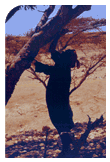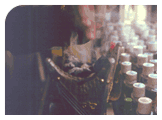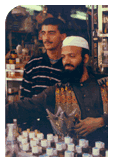 |
 |
 |
|
|||
|
On The Frankincense Trail For those who don't know, the Sultanate of Oman, as it's officially called, is an oil-rich, Gulf state about the size of Kansas at the bottom of the Arabian peninsula. I was surprised to learn that its southwestern coast, a region known as Dhofar, is a tropical paradise, with mountain ranges looming large and lush above the shores of the Arabian Sea. This sea is barrier between the cool, coastal plain and the desert, or if you will, between heaven and hell. 
It's this particular blend of environmental ingredients - strong sunlight, nutrient-rich, mountain soil, and moisture from annual monsoons blowing across the sea from India - that make it possible for Boswelia sacra, the frankincense tree, to thrive here. It is, in fact, one of the few places on earth where the squat, bushy, unassuming tree grows at all. Each summer, as they have for nearly five thousand years, the tribal inhabitants of these mountains harvest the sap of Boswelia sacra by making incisions in the papery bark. A few weeks later, after the milky white sap has oozed out and hardened into sugary gold droplets, harvesters scrape the droplets off the tree and store them in clay jars in nearby caves, where they cure for about another month. Pickup trucks have replaced the camels once used to bring frankincense down from the mountains, but the spice bazaar in the nearby port city of Salalah, Dhofar's major frankincense market, hasn't changed, I'm told, for centuries. Here, spice merchants, sitting cross-legged on woven mats and oriental carpets, have been peddling frankincense since it was one of the most precious commodities in the ancient world . . . coveted by Egyptian pharaohs, Roman emperors, and Old Testament prophets alike.
Bible: And the Lord said unto Moses, take unto thee sweet spices with frankincense and make it a perfume, tempered together, pure and holy (Exodus 30, 34). 
God may have shared the ingredients for incense with Moses, but the prophet would've had a much harder time cutting the same deal with the ladies at Salalah's spice market. These women have spent a lifetime perfecting their own secret blends of frankincense and spices. Some of these concoctions sell for as much as two to three hundred dollars for a small, hockey-puck sized tin. Many Arabs use incense today to scent their homes, their clothes, even their offices. Unadulturated frankincense isn't nearly as expensive, and can be had for about $2 to $10 a pound. This is a far cry from the days when it was literally worth its weight in gold. There is, however, at least one frankincense product that still fetches prices fit for a Magi. At Oman Perfumery in the capital city of Muscat, about 650 miles up the coast, only the best frankincense is sorted and selected to make Amouage, touted as the most valuable perfume in the world.
Mustafa: These flasks are handcrafted out of sterling silver, plated with 24-carat gold, they were designed by . . . (fade down) 
General manager Mustafa Durani showed me around the retail end of the operation, which looked more like a museum than a shop. I saw and sniffed every manifestation of Amouage, from the relatively low-end, $150 an ounce stuff to a black onyx presentation bottle embossed with the royal coat-of-arms that the sultan bestows on visiting dignitaries. Durani assured me that if he were ever to sell one of them to a regular customer, he'd be thrown in jail. As modern, comfy and cushy as Muscat was, I did have to get back on the trail and that meant putting out to sea in a dhow, the classic galleon-shaped Arab trading vessel that merchants still use to transport goods between the Persian Gulf and coast of Africa, just as they did during the days of frankincense trade. So join me, Tom Verde, next week as I shove off for the coast of Yemen, staying well clear of Aden, on the Savvy Traveler. Air transportation and accommodations provided by the Oman Ministry of Information
{ On the Frankincense Trail: Part One | Part Two | Part Three | Part Four | Part Five }
|
 | American Public Media Home | Search | How to Listen ©2004 American Public Media | Terms of Use | Privacy Policy |
